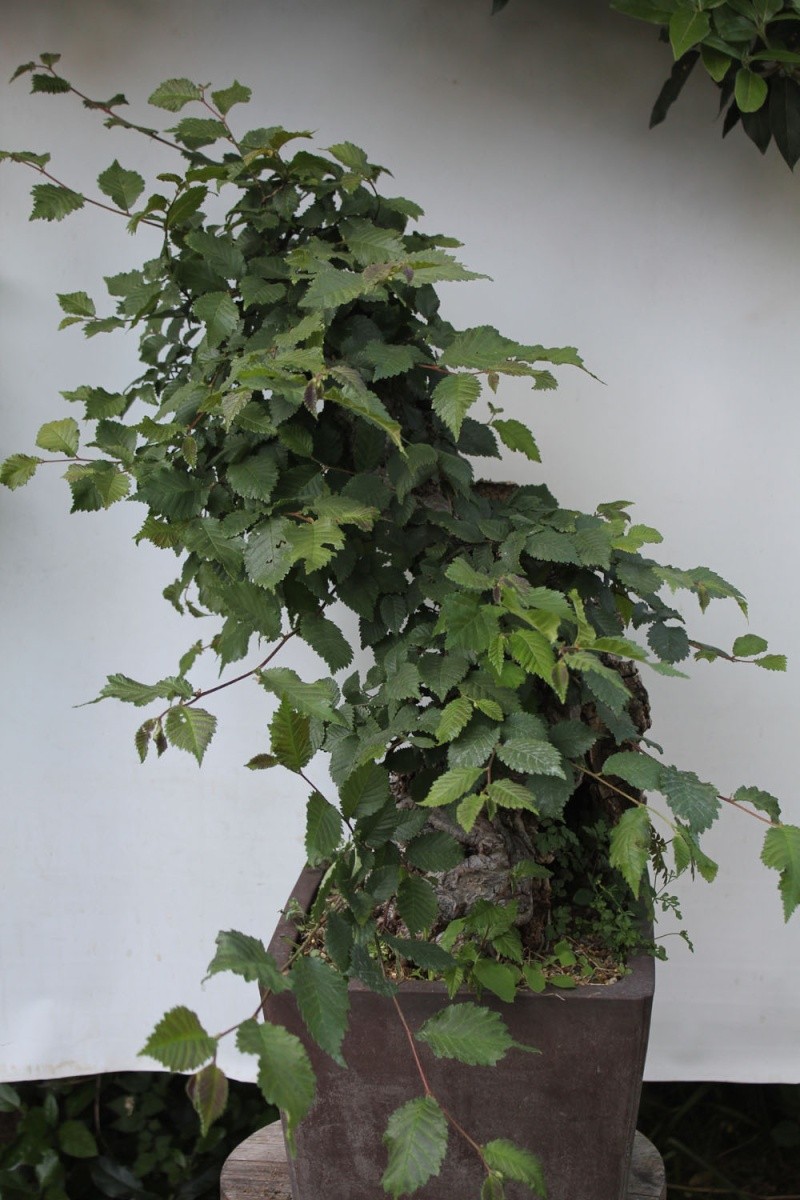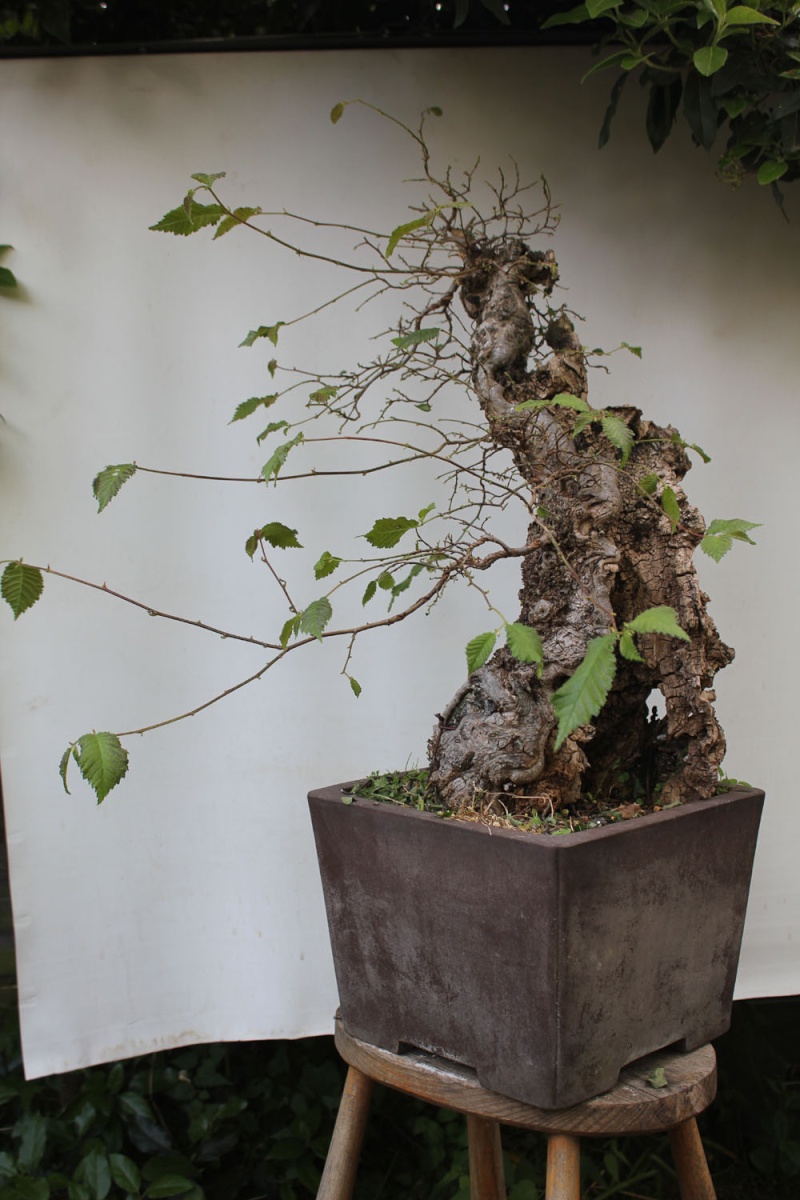Big ol Layer
+18
Andrei Darusenkov
Bob Brunt
Ricky Keaton
prestontolbert
Hans van Meer.
mike page
pongsatorn.k
Jonny D
moyogijohn
Jerry Meislik
Todd Ellis
pmjos
Kev Bailey
Rob Kempinski
Pavel Slovák
peter keane
NeilDellinger
anttal63
22 posters
Page 2 of 3
Page 2 of 3 •  1, 2, 3
1, 2, 3 
 Re: Big ol Layer
Re: Big ol Layer
Hello Mike. I do remember the series (just). My parents watched it, back when there was a choice of three channels. No relation by the way.
Guest- Guest
 Re: Big ol Layer
Re: Big ol Layer
Will,
Questions:
There are two branches on the front pf the tree, just to left of the hollow. One is positioned upwards, the other sharply downwards. Do you intend to leave those? I like the upward growing shoot for a few different reasons as opposed to the one positioned down.
There are numerous shoots one the left of the trunk, do you intend to leave all of those? Could one or two be moved across the back to give some more weight to the right side of the tree (as a back branch)? I am guessing few buds emerged to the right of the hollow/back?
Clearly its a great tree any way you look at it.
Neil
Questions:
There are two branches on the front pf the tree, just to left of the hollow. One is positioned upwards, the other sharply downwards. Do you intend to leave those? I like the upward growing shoot for a few different reasons as opposed to the one positioned down.
There are numerous shoots one the left of the trunk, do you intend to leave all of those? Could one or two be moved across the back to give some more weight to the right side of the tree (as a back branch)? I am guessing few buds emerged to the right of the hollow/back?
Clearly its a great tree any way you look at it.
Neil
NeilDellinger- Member
 Re: Big ol Layer
Re: Big ol Layer
Hello Neil. The back of the tree is deadwood and therefore no branches for depth except at the top. If I do keep it as one tree. The majority of envisaged foliage will be to the left, even at the bottom, with a small amount coming across the deadwood on the right. As I have said, I am not completely happy with the first styling and have left extra branches for possible changes in the future. I tend to do this quite often with deciduous trees anyway, in case branches are lost.
Guest- Guest
 Re: Big ol Layer
Re: Big ol Layer
Will,
You did say that. I missed your comment about leaving the extras. I do the same thing pretty often with my elms. Any way its a cool tree.
Neil
You did say that. I missed your comment about leaving the extras. I do the same thing pretty often with my elms. Any way its a cool tree.
Neil
NeilDellinger- Member
 Re: Big ol Layer
Re: Big ol Layer
Hi Will,
nice stump you got there!
As promised, although a bit late, here is my view on your tree as it is now!
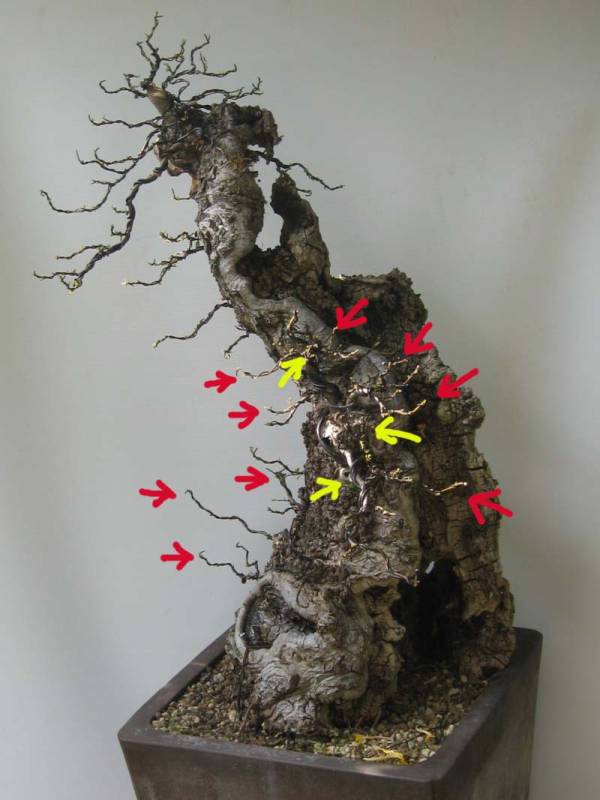
Those branches (red and yellow arrows) on the lower part of the tree are all clustered together. So in the future, when they mature, you will end up with a bush like tree, with out the proper branch structure to resemble a large tree in nature!
The Yellow arrow branches all emerge from the front side of the tree and that is mostly not don this low on a tree! Poking the eye you know! So most of those lower placed branches need to be removed, leaving single placed branches, so that you can work further with these branches to creat a proper branch skeleton. That is, if you want to have your branches to start that low on the tree? I would recommend not to do that! Not if you want to take full advantage from this battered old trunk line to creat a old large tree that lives in the distance. Low placed and bush like branch structure will most often not help to tell that story!
So most of those lower placed branches need to be removed, leaving single placed branches, so that you can work further with these branches to creat a proper branch skeleton. That is, if you want to have your branches to start that low on the tree? I would recommend not to do that! Not if you want to take full advantage from this battered old trunk line to creat a old large tree that lives in the distance. Low placed and bush like branch structure will most often not help to tell that story!
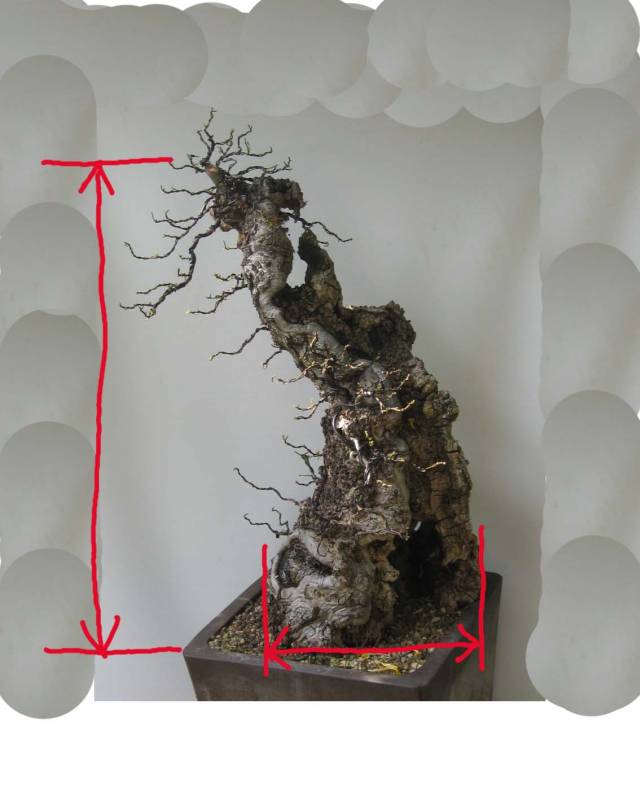
If you look at the above picture you can see the hight of the tree in relation to the base of the trunk. This gives you a possible idea of the size and hight of the tree as it would be in nature. With this knowledge you can figure out how the tree could have or should more or less look in real live!
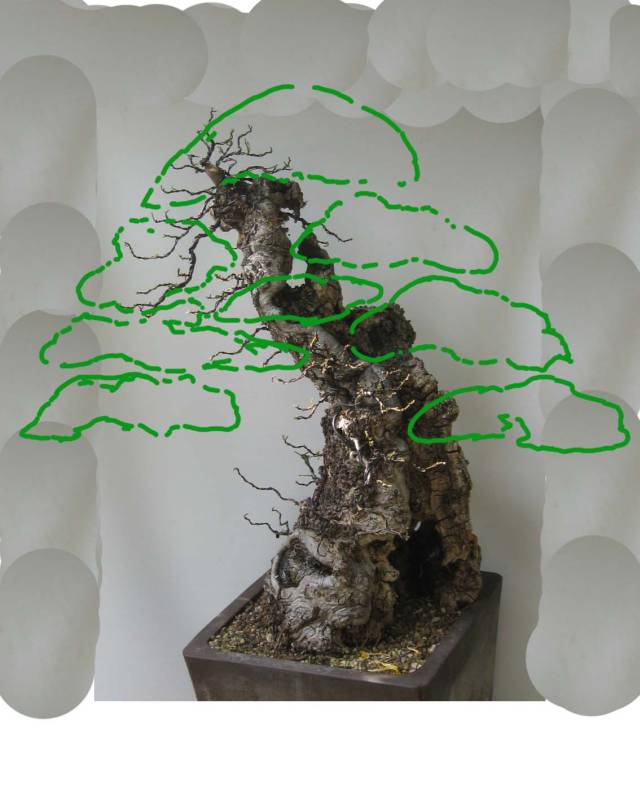
Above: Something like that would be possible! The bulk of the foliage is in proportion to the size and height of the trunk! Remember this is not a design, it is just to give you an general idea from witch height you want your branches to be placed!

Above: This is one of the many posible designs, but it is one I like my self. The bottom section of the tree is left branch less, like with a old tree. Nothing is disturbing our view of that beautiful battered trunk line and Shari! And the negative spaces on both sides of the trunk are wonderful!

Above: This is a rough impression of the image I see in your tree. It is just a drawing to show you the outlines of the image, in real live the branch structure and image would be more like a deciduous tree, and not so symmetrical This design shows all the beauty of the trunk movement with its lovely Shari. The falling branch is placed perfectly and gives the tree balance and makes it special! It is a mixture between old and new school, almost Bunjin like!
Any way it is very late and I am of to bed now, I hope it will give you some idea or help my friend!
Cheers,
Hans van Meer.
---------------------------------------------------------------------------
nice stump you got there!
As promised, although a bit late, here is my view on your tree as it is now!

Those branches (red and yellow arrows) on the lower part of the tree are all clustered together. So in the future, when they mature, you will end up with a bush like tree, with out the proper branch structure to resemble a large tree in nature!
The Yellow arrow branches all emerge from the front side of the tree and that is mostly not don this low on a tree! Poking the eye you know!

If you look at the above picture you can see the hight of the tree in relation to the base of the trunk. This gives you a possible idea of the size and hight of the tree as it would be in nature. With this knowledge you can figure out how the tree could have or should more or less look in real live!

Above: Something like that would be possible! The bulk of the foliage is in proportion to the size and height of the trunk! Remember this is not a design, it is just to give you an general idea from witch height you want your branches to be placed!

Above: This is one of the many posible designs, but it is one I like my self. The bottom section of the tree is left branch less, like with a old tree. Nothing is disturbing our view of that beautiful battered trunk line and Shari! And the negative spaces on both sides of the trunk are wonderful!

Above: This is a rough impression of the image I see in your tree. It is just a drawing to show you the outlines of the image, in real live the branch structure and image would be more like a deciduous tree, and not so symmetrical This design shows all the beauty of the trunk movement with its lovely Shari. The falling branch is placed perfectly and gives the tree balance and makes it special! It is a mixture between old and new school, almost Bunjin like!
Any way it is very late and I am of to bed now, I hope it will give you some idea or help my friend!
Cheers,
Hans van Meer.
---------------------------------------------------------------------------

Hans van Meer.- Member
 Re: Big ol Layer
Re: Big ol Layer
Cool...Hans very eloquently articulated exactly what I was seeing but was unable to put into words.
I like the first outline hans provided.
I like the first outline hans provided.
Last edited by NeilDellinger on Thu Jul 01, 2010 3:51 am; edited 1 time in total (Reason for editing : typo)
NeilDellinger- Member
 Re: Big ol Layer
Re: Big ol Layer
Hans. Who da Man?.......You da Man!!! Thankyou sooo much for giving up your time on these excellent ideas. Wonderful. 

Guest- Guest
 Big ol layer
Big ol layer
Will ,I am a lot late in posting been following all along...PLEASE DO NOT CUT OR LAYER THAT TREE!!!!! Hans van meer gave two opions for a nice looking bonsai to me .I would go with one of them and save all of that wonderful trunk.. keep posting pictures please I love that trunk..good luck john in west virginia....
moyogijohn- Member
 Big ol layer
Big ol layer
Hello John. Don't worry, I have no plans to divide the tree. When I aquire a tree, I like to think and plan as many options as possible. The biggest problem I have now is preserving the deadwood. Big headache!!!
Guest- Guest
 Re: Big ol Layer
Re: Big ol Layer
I love the rotation Will! already improving. Hans a very cool design, really dig that canopy! 

anttal63- Member
 Re: Big ol Layer
Re: Big ol Layer
I was just wondering about the deadwood. What are you doing for preservation?

prestontolbert- Member
 Re: Big ol Layer
Re: Big ol Layer
My regime involves 2 components. Ronseal wet rot wood hardener, a spirit based resin and teak oil as a waterproofer. I have preserved the deadwood on another Elm for over 10 years but have noticed a deterioration over the last couple of years. The problem lies where the deadwood meets the soil. My plan for the future is to remove all the deadwood at soil level and hopefully avoiding repeat wetting and drying of the deadwood.prestontolbert wrote:I was just wondering about the deadwood. What are you doing for preservation?
Guest- Guest
 Re: Big ol Layer
Re: Big ol Layer
Hello Ricky. I have found Elm species very easy to layer. After collection, the tree was allowed to gain strength for 2 years. Strong branch growth means strong root growth. In the Spring, as the buds are about to break, I removed a strip of bark and cambium about 2" wide all the way round the live vein. Special care should be made to remove all the cambium so there is no bridge across the gap. It is easy to see any residual cambium as it turns brown in the air. It is also important to have a very clean cut, so use sharp tools. I then made a ring of pot mesh, about 6" deep and place it around the tree, resting it on the old soil. This was then filled with sphagnum moss and pushed in tightly so that all of the cut area was in good contact with the moss. Within 6 weeks, root tips were growing out through the mesh, so I removed the airlayer with a sharp saw, Trying not to disturb the moss too much as the new roots are fragile. This was then potted up and left until Spring, before removing the moss.
Guest- Guest
 Re : Big ol Layer
Re : Big ol Layer
Hi Will
This is turning out to be a very informative post.I don't yet have an elm in my collection but this makes me want to go out and get one...Not that I have found any up here in the northwest.I haven't tried air layering yet.I have my eye on a few local trees (Birch ) that I could either air layer or maybe even ground layer.Will have a bash next spring ....Cheers Will keep up the good work.

This is turning out to be a very informative post.I don't yet have an elm in my collection but this makes me want to go out and get one...Not that I have found any up here in the northwest.I haven't tried air layering yet.I have my eye on a few local trees (Birch ) that I could either air layer or maybe even ground layer.Will have a bash next spring ....Cheers Will keep up the good work.


Bob Brunt- Member
 Re : Big ol Layer
Re : Big ol Layer
Hello Bob. Don't know why they're so sparce up north, they grow like weeds darn sarf.
Guest- Guest
 Re: Big ol Layer
Re: Big ol Layer
will baddeley wrote:Hello Ricky. I have found Elm species very easy to layer. After collection, the tree was allowed to gain strength for 2 years. Strong branch growth means strong root growth. In the Spring, as the buds are about to break, I removed a strip of bark and cambium about 2" wide all the way round the live vein. Special care should be made to remove all the cambium so there is no bridge across the gap. It is easy to see any residual cambium as it turns brown in the air. It is also important to have a very clean cut, so use sharp tools. I then made a ring of pot mesh, about 6" deep and place it around the tree, resting it on the old soil. This was then filled with sphagnum moss and pushed in tightly so that all of the cut area was in good contact with the moss. Within 6 weeks, root tips were growing out through the mesh, so I removed the airlayer with a sharp saw, Trying not to disturb the moss too much as the new roots are fragile. This was then potted up and left until Spring, before removing the moss.
great, ok what is the ring of pot mesh?
what was the diameter of the pot?
so the ring cut was only a few inches above the existing soil?
would u happen to have a picture of the tree with the layer on it?

Ricky Keaton- Member
 Re: Big ol Layer
Re: Big ol Layer
Hello Ricky. In the UK, we can buy the mesh that covers the pot drainage holes in A4 sheets. This can be cut into strips and wired together to form a ring and raise the soil level. Alternatively, you could use the rim of a normal plastic garden plant pot.
In this case the point of airlayer was just above soil level. If it were for instance, at the top of the tree and the diameter at the place of airlayering is 3" 75mm. Find a plastic garden pot with a base diameter of at least 6" 150mm. Cut a straight line from the rim to the bottom and from the bottom to the middle of the base. Then cut a 3" 75mm hole in the middle of the base. Cut away your ring of bark as in previous post and then place your split pot around the trunk. 2 holes in t5he rim of the pot with wires attatched, will help you secure the pot to the tree and stop it slipping down. Holes on either side of the split in the pot are wired together making the pot rigid again. Pack the pot with moss and then water. Another tip is to rotate the tree on a regular basis for a nice even rooting.
In this case the point of airlayer was just above soil level. If it were for instance, at the top of the tree and the diameter at the place of airlayering is 3" 75mm. Find a plastic garden pot with a base diameter of at least 6" 150mm. Cut a straight line from the rim to the bottom and from the bottom to the middle of the base. Then cut a 3" 75mm hole in the middle of the base. Cut away your ring of bark as in previous post and then place your split pot around the trunk. 2 holes in t5he rim of the pot with wires attatched, will help you secure the pot to the tree and stop it slipping down. Holes on either side of the split in the pot are wired together making the pot rigid again. Pack the pot with moss and then water. Another tip is to rotate the tree on a regular basis for a nice even rooting.
Guest- Guest
 Re: Big ol Layer
Re: Big ol Layer
Will, do you believe that in rotating the tree it is warmth from the sun that intiates even rooting all around? If so, I agree completely with you. I argue with others who say that you need to stop the layer from getting too hot/stop sunlight penetrating. Perhaps in Florida that may be the case but over here any warmth is useful!
Next problem. How to encourage even rooting on thick branches layered on a tree in the ground? I frequently have layers with one side well rooted and none on the other.
Next problem. How to encourage even rooting on thick branches layered on a tree in the ground? I frequently have layers with one side well rooted and none on the other.

Kev Bailey- Admin
 Big ol Layer
Big ol Layer
Hello Kev. I'm not sure whether it's the warmth of the sun or the light. Cut down any tree and the growth rings will be bigger on the sunny side. I imagine because the branches grow stronger on the sunny side, so do the roots. With airlayers in the ground, try experimenting with cutting back the foliage or leaf pruning on the sunny side. Alternatively, try a mirror on the back.
Guest- Guest
Page 2 of 3 •  1, 2, 3
1, 2, 3 
 Similar topics
Similar topics» Japanese Maple, to layer or not to layer?
» Where to layer?
» Small Elm winter image
» To air layer or not to air layer?
» BUNJIN KINGSVILLE
» Where to layer?
» Small Elm winter image
» To air layer or not to air layer?
» BUNJIN KINGSVILLE
Page 2 of 3
Permissions in this forum:
You cannot reply to topics in this forum









